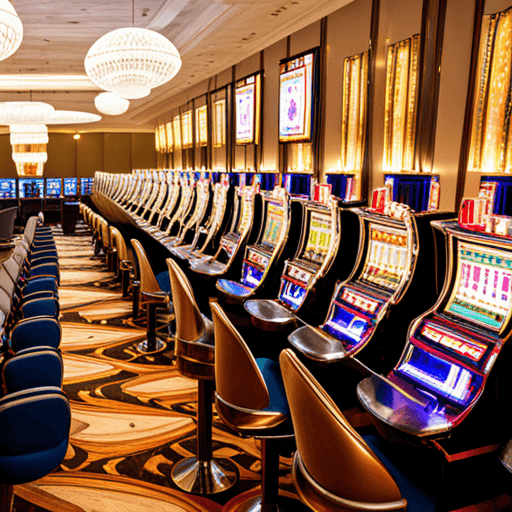The Cultural Impact of Gambling Activities Worldwide

Gambling games have long been a captivating entertainment option, drawing millions of players from varied cultures around the globe. From the opulent casinos of the Strip to the busy gambling halls of the Chinese gambling capital, these games serve as a link that connects people across different backgrounds. The allure of fortune, strategy, and risk entices not only those hoping to win money but also those in search of a sense of community.
The influence of casino games extends far beyond the gaming floor. Xổ Số 77WIN They often embody the cultural standards and beliefs of the societies in which they thrive. Games such as Texas hold 'em, blackjack, and the wheel game have woven themselves into the tapestry of mainstream culture, influencing everything from movies to fashion. As we explore this fascinating intersection of chance and society, we can gain insights into how casino games shape and are affected by the environment surrounding us.
Historical Progression of Gaming Activities
The roots of gaming games can be followed back to ancient cultures, where gambling in various forms was widely practiced. In Ancient China, around 2300 B.C., a form of lottery known as Keno was well-known, while in historic Rome, soldiers would often gamble on the outcomes of their games. The concept of using randomness for fun and income progressed over the centuries, leading to the formation of more structured games. By the final Middle Ages, betting houses initiated to appear in the continent, particularly in the Italian peninsula, which introduced early forms of well-liked activities still practiced today.
As gambling gained popularity in the continent, the 17th and 18th centuries saw the emergence of gaming houses as exclusive locations for betting. The earliest official casino, the Ridotto, was established in the Venetian city in the year 1638, offering activities like the game of Baccarat and Faro. This period marked a crucial shifting point, as casinos began to welcome not just the wealthy but also the expanding middle class. The complexity of games evolved, leading to the creation of new regulations and variations that enriched the gaming experience.
In the 19th century, the industrial age and transformations in social standards additionally altered the terrain of gaming games. The launch of roulette and modern slot machines drew a larger audience, and gaming houses became seen as legitimate fun. This time witnessed the worldwide proliferation of gambling, as casinos spread from Europe to the Americas, culminating in the establishment of the legendary Las Vegas Boulevard in the 1900s. The progress of casino activities has persisted into the present day, incorporating technology and online platforms, allowing them available to a worldwide population.
## Cultural Significance within Various Cultures
Gambling games have profound social importance in a multitude of societies around the planet. For instance, in Las Vegas, the very core of the urban landscape is woven around casinos, where playing is not just a pastime but a fundamental aspect of social engagement and social interaction. The vivid lights and vibrant atmosphere attract millions, showcasing how gambling activities can shape local economical structures and cultural uniqueness. This surrounding transforms the notion of relaxation into an immersive experience that shapes apparel, melodies, and even movies.
On the other hand, some societies approach wagering with more caution, viewing it through the lens of morality and tradition. For example, in numerous Oriental cultures, games like Mahjong and Pai Gow are steeped in history and possess significant social relevance. These games are often played during get-togethers and celebrations, fostering community bonds and solidifying kinship ties. The act of participating in these games goes past mere leisure, reflecting values such as honoring elders and the value of communal fun.
Simultaneously, in Western countries such as Monaco and Italy, casino games serve as symbols of luxury and sophistication. The elegant atmosphere of these venues attracts both visitors and native inhabitants, upholding a sense of distinction and elitism. The art of Texas Hold'em and the strategic elements of games like banker’s game are appreciated, shaping interpersonal interactions and establishing an appeal that captivates a heterogeneous audience. This underscores how gambling can concurrently reflect and mold societal views towards hazard, reward, and community interaction.
Financial Influence and Tourism
Casino games play a crucial role in the economic landscape of many areas, particularly those that depend significantly on visitor traffic. The revenue generated from casino operations fuels local financial systems, creating jobs not only within the casinos themselves but also in connected industries such as hotel management, dining, and recreation. This surge of tourists, drawn by the allure of games and the overall casino experience, stimulates expenditure across multiple businesses, contributing to the economic health of the area.
The existence of casinos often leads to the development of facilities, including hotels, public transit, and leisure amenities. These improvements are essential in enhancing the overall visitor satisfaction, making locations more attractive to tourists. Additionally, many casinos contribute in local communities through support of events and philanthropic activities, further embedding themselves into the community structure of the region. Such investment not only supports economic growth but also cultivates a positive image of the gambling sector.
Moreover, the global popularity of casino games drives competitive tourism, with locations vying to attract players from across the globe. 77WIN Iconic destinations like Las Vegas and Macau have become identifiable with gambling culture, drawing millions each year. This competitive edge encourages innovation and diversification within the gambling sector, influencing trends in leisure and accommodation that extend beyond their limits. The ripple effects of this visitor influx extend wide, impacting local economies and cultural exchanges on a worldwide scale.
